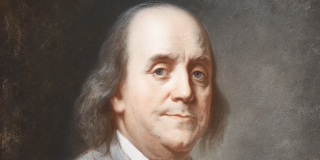
George Lyttelton (1709–1773)
Protest against the Bill to Repeal the American Stamp Act, annotated by Benjamin Franklin
Paris: Chez J.W. Imprimeur (false locus; London), 1766
Rare Book Division
Protest against the Bill to Repeal the American Stamp Act, annotated by Benjamin Franklin
Benjamin Franklin was in England as the agent for Pennsylvania in 1765 when Parliament imposed a tax on newspapers as well as legal and commercial documents in the 13 colonies. Franklin initially supported the Stamp Act, so called because the materials it affected would be stamped upon payment of the tax, but reconsidered when he learned of the colonists’ anger. Franklin filled this volume by the first Baron Lyttleton, a British statesman, with copious marginal notes that are highly critical of the author’s pro-Stamp Act stance. On February 13, 1766, Franklin testified against the tax before England’s House of Commons, answering Parliamentarians’ questions so deftly that the ill-advised nature of the legislation became obvious. The tax was abolished one month later, in part due to Franklin’s persuasiveness. He himself attributed success “to what the Profane would call Luck, & the Pious Providence.”
Currently on View at Stephen A. Schwarzman Building
The New York Public Library believes that this item is in the public domain under the laws of the United States, but did not make a determination as to its copyright status under the copyright laws of other countries. This item may not be in the public domain under the laws of other countries. Though not required, if you want to credit us as the source, please use the following statement, "From The New York Public Library," and provide a link back to the item on our Digital Collections site. Doing so helps us track how our collection is used and helps justify freely releasing even more content in the future.






